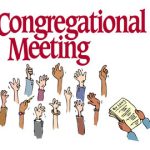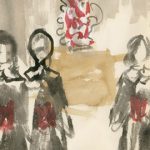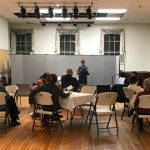Simeon and Jesus open up ethical monotheism
Simeon’s song of praise is an embedded poem that makes it clear that Jesus’ mission will extend to Gentile or non-Jews. There is a prose introduction and a prose conclusion. Luke 2:25-35 New Revised Standard Version
Prose Introduction
25 Now there was a man in Jerusalem whose name was Simeon; this man was righteous and devout, looking forward to the consolation of Israel, and the Holy Spirit rested on him. 26 It had been revealed to him by the Holy Spirit that he would not see death before he had seen the Lord’s Messiah. 27 Guided by the Spirit, Simeon came into the temple, and when the parents brought in the child Jesus to do for him what was customary under the law, 28 Simeon took him in his arms and praised God, saying,
Embedded Poem
29 “Master, now you are dismissing your servant in peace,
according to your word,
30 for my eyes have seen your salvation,
31 which you have prepared in the presence of all peoples,
32 a light for revelation to the gentiles
and for glory to your people Israel.”
Prose Conclusion
33 And the child’s father and mother were amazed at what was being said about him. 34 Then Simeon blessed them and said to his mother Mary, “This child is destined for the falling and the rising of many in Israel and to be a sign that will be opposed 35 so that the inner thoughts of many will be revealed—and a sword will pierce your own soul, too.”
Old Testament background
The footnote to this passage in the Jewish Annotated New Testament is significant. In summary Judaism generally taught that salvation was for all people as expressed in Isaiah 49:6.
he (the Lord. parenthesis mine) says,
“It is too light a thing that you should be my servant
to raise up the tribes of Jacob
and to restore the survivors of Israel;
I will give you as a light to the nations,
that my salvation may reach to the end of the earth.”
The implication is that the strength of light God gave to Israel would be more substantial when shared.
Considerations for today
Ethical monotheism in contrast to worshiping the Roman emperor and Greek and Roman gods could potentially open up a better ethical life for non-Jewish or Gentile people. An essential component of the word salvation is healing. What pieces of biblical literature or contemporary literature or literary classics help you to live an ethical life or heal from brokenness? Literature and art can be considered as God’s auxiliary.
Grace and Peace,
Sharon
You can purchase a Kindle copy of Biblical Poems Embedded in Biblical Narratives for $2.99.
This offer is good until I am finished with this blog of about 12 bimonthly issues which are based on my book. If you want a print copy at 50 percent off the retail, order on the Wipf and Stock website. www.wipfandstock.com. Use online coupon code: SHAIR Be sure to check out all my books on the Wipf and Stock website
For new readers: My goal is to present information about biblical poetry in short, readable pieces. The motto is “Bit by bit, insights lit.” Blogs will generally be 200 words or less; not counting the biblical quotation. The plan is to send 2 blogs per month for a total of 10-12 essays.











